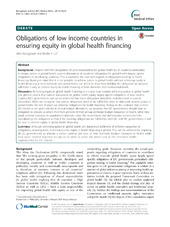| dc.contributor.author | Barugahare, John | |
| dc.contributor.author | Lie, Reidar K. | |
| dc.date.accessioned | 2016-03-16T13:47:39Z | |
| dc.date.available | 2016-03-16T13:47:39Z | |
| dc.date.issued | 2015-09-08 | |
| dc.Published | BMC Medical Ethics 2015, 16:59 | eng |
| dc.identifier.issn | 1472-6939 | |
| dc.identifier.uri | https://hdl.handle.net/1956/11692 | |
| dc.description.abstract | Background. Despite common recognition of joint responsibility for global health by all countries particularly to ensure justice in global health, current discussions of countries’ obligations for global health largely ignore obligations of developing countries. This is especially the case with regards to obligations relating to health financing. Bearing in mind that it is not possible to achieve justice in global health without achieving equity in health financing at both domestic and global levels, our aim is to show how fulfilling the obligation we propose will make it easy to achieve equity in health financing at both domestic and international levels. Discussion. Achieving equity in global health financing is a crucial step towards achieving justice in global health. Our general view is that current discussions on global health equity largely ignore obligations of Low Income Country (LIC) governments and we recommend that these obligations should be mainstreamed in current discussions. While we recognise that various obligations need to be fulfilled in order to ultimately achieve justice in global health, for lack of space we prioritise obligations for health financing. Basing on the evidence that in most LICs health is not given priority in annual budget allocations, we propose that LIC governments should bear an obligation to allocate a certain minimum percent of their annual domestic budget resources to health, while they await external resources to supplement domestic ones. We recommend and demonstrate a mechanism for coordinating this obligation so that if the resulting obligations are fulfilled by both LIC and HIC governments it will be easy to achieve equity in global health financing. Summary. Although achieving justice in global health will depend on fulfilment of different categories of obligations, ensuring inter- and intra-country equity in health financing is pivotal. This can be achieved by requiring all LIC governments to allocate a certain optimal per cent of their domestic budget resources to health while they await external resources to top up in order to cover the whole cost of the minimum health opportunities for LIC citizens. | en_US |
| dc.language.iso | eng | eng |
| dc.publisher | BioMed Central | eng |
| dc.relation.ispartof | <a href="http://hdl.handle.net/1956/12319" target="blank">Can Resource-Poor Countries Bear any Obligations for Global Distributive Justice? A Reflection on the Distribution of Global health Opportunities</a> | |
| dc.rights | Attribution CC BY 4.0 | eng |
| dc.rights.uri | http://creativecommons.org/licenses/by/4.0 | eng |
| dc.title | Obligations of low income countries in ensuring equity in global health financing | eng |
| dc.type | Peer reviewed | |
| dc.type | Journal article | |
| dc.date.updated | 2015-11-10T11:39:47Z | |
| dc.description.version | publishedVersion | |
| dc.rights.holder | Copyright Barugahare and Lie. 2015 | eng |
| dc.identifier.doi | https://doi.org/10.1186/s12910-015-0055-3 | |
| dc.identifier.cristin | 1281312 | |
| dc.subject.nsi | VDP::Humaniora: 000::Filosofiske fag: 160 | |

